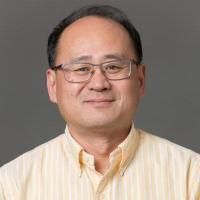Maternal HIV-1 envelope-specific antibody responses and reduced risk of perinatal transmission.
Date
2015-07-01
Journal Title
Journal ISSN
Volume Title
Repository Usage Stats
views
downloads
Citation Stats
Abstract
Despite the wide availability of antiretroviral drugs, more than 250,000 infants are vertically infected with HIV-1 annually, emphasizing the need for additional interventions to eliminate pediatric HIV-1 infections. Here, we aimed to define humoral immune correlates of risk of mother-to-child transmission (MTCT) of HIV-1, including responses associated with protection in the RV144 vaccine trial. Eighty-three untreated, HIV-1-transmitting mothers and 165 propensity score-matched nontransmitting mothers were selected from the Women and Infants Transmission Study (WITS) of US nonbreastfeeding, HIV-1-infected mothers. In a multivariable logistic regression model, the magnitude of the maternal IgG responses specific for the third variable loop (V3) of the HIV-1 envelope was predictive of a reduced risk of MTCT. Neutralizing Ab responses against easy-to-neutralize (tier 1) HIV-1 strains also predicted a reduced risk of peripartum transmission in secondary analyses. Moreover, recombinant maternal V3-specific IgG mAbs mediated neutralization of autologous HIV-1 isolates. Thus, common V3-specific Ab responses in maternal plasma predicted a reduced risk of MTCT and mediated autologous virus neutralization, suggesting that boosting these maternal Ab responses may further reduce HIV-1 MTCT.
Type
Department
Description
Provenance
Subjects
Citation
Permalink
Published Version (Please cite this version)
Publication Info
Permar, Sallie R, Youyi Fong, Nathan Vandergrift, Genevieve G Fouda, Peter Gilbert, Robert Parks, Frederick H Jaeger, Justin Pollara, et al. (2015). Maternal HIV-1 envelope-specific antibody responses and reduced risk of perinatal transmission. J Clin Invest, 125(7). pp. 2702–2706. 10.1172/JCI81593 Retrieved from https://hdl.handle.net/10161/12060.
This is constructed from limited available data and may be imprecise. To cite this article, please review & use the official citation provided by the journal.
Collections
Scholars@Duke

Justin Joseph Pollara
Dr. Justin Pollara is a member of the Duke Human Vaccine Institute and the Duke Center for Human Systems Immunology, and is Associate Director of the Duke Center for AIDS Research (CFAR) Developmental Core. He received his PhD from North Carolina State University and completed his postdoctoral training as a recipient of the Duke NIH Interdisciplinary Research Training Program in AIDS (IRTPA) T32 award in the laboratory of Dr. Guido Ferrari. He joined the faculty of the Duke Department of Surgery in 2016.
A common theme of research performed in Dr. Pollara’s laboratory is a focus on interactions between innate and adaptive immunity. Dr. Pollara’s work has contributed significantly to the understanding of the roles played by non-neutralizing antibodies in limiting HIV-1 disease progression, and in prevention of infection or control of virus replication in preclinical and clinical HIV-1 vaccine trials. Dr. Pollara’s research has also identified specific components of the immune response that reduce the risk of vertical transmission of both HIV-1 and human cytomegalovirus. The Pollara lab characterizes the phenotype and functionality of antibody-interacting innate immune cells and explores how natural genetic variation in antibodies and antibody receptors may contribute to vaccine responsiveness and immune competence. Further, with a strong interdisciplinary and collaborative approach, the Pollara Lab has broadened its scope beyond infectious diseases and is now actively leading studies aimed at understanding how inflammation, antibodies, innate immune cells, and newly described populations of T cells promote allograft injury that underlies rejection of transplanted organs.

Marcella Sarzotti-Kelsoe
Ongoing Applied Activities
•I direct a Global Quality Assurance Program, which I developed and pioneered here at Duke University, to oversee compliance with Good Clinical Laboratory Practice Guidelines in three HIV vaccine trial networks (CHAVI, CAVD, Duke HVTN, EQAPOL, Duke VTEU) involving domestic and international laboratory sites.
•I also direct a Global Proficiency Testing Program for laboratories testing for neutralizing antibody function in individuals infected with HIV or vaccinated against HIV. The Program was launched in 2009.
•I provide assistance and oversight for endpoint assay standardization, qualification and validation, as well as for the QSU of the GMP facility at DHVI, which will manufacture HIV vaccine products for first-in-man Phase I trials.
Past Basic Research
•Development of T cell responses in neonates.
•Neonatal T cell receptor Vβ repertoire diversity in the peripheral T cell pool.
•The role of heat shock protein, as a natural adjuvant, at eliciting innate and adaptive immune responses.
•Development of the T cell receptor repertoire in naïve, immunodeficient infants, given bone marrow or thymic transplantation.
•Thymic output, T cell diversity and T cell function in long-term human SCID chimeras.
•Telomere length in T cells from SCID chimeras.

Guido Ferrari
The activities of the Ferrari Laboratory are based on both independent basic research and immune monitoring studies. The research revolves around three main areas of interest: class I-mediated cytotoxic CD8+ T cell responses, antibody-dependent cellular cytotoxicity (ADCC), gene expression in NK and T cellular subsets upon infection with HIV-1. With continuous funding over the last 11 years from the NIH and Bill & Melinda Gates Foundation along with many other productive collaborations within and outside of Duke, the Ferrari Lab has expanded its focus of research to include the ontogeny of HIV-1 specific immune responses that work by eliminating HIV-1 infected cells and how these can be induced by AIDS vaccine candidates.

S. Munir Alam
Research Interests.
The Alam laboratory’s primary research is focused on understanding the biophysical properties of antigen-antibody binding and the molecular events of early B cell activation using the HIV-1 broadly neutralizing antibody (bnAb) lineage models. We are studying how HIV-1 Envelope proteins of varying affinities are sensed by B cells expressing HIV-1 bnAbs or their germline antigen receptors and initiate early signaling events for their activation. In the long-term these studies will facilitate design and pre-selection of immunogens for testing in animal models and accelerate HIV-1 vaccine development.
Current research include the following NIAID-funded projects
Antigen recognition and activation of B cell antigen receptors with the specificity of HIV-1 broadly neutralizing antibodies. This project involves elucidating the early events on the B cell surface following antigen (Ag) engagement of the B cell antigen receptor (BCR) and to provide an assessment of the in vivo potential of an Ag to drive B cell activation. We are performing biophysical interactions analyses and using high-resolution microscopy to define the physico-chemical properties of BCR-Ag interactions that govern signaling and activation thresholds for BCR triggering and the BCR endocytic function in antigen internalization. The overall objective of these studies is to bridge the quantitative biophysical and membrane dynamics measurements of Ag-BCR interactions to ex-vivo and in-vivo B cell activation. This NIAID-funded research is a collaboration with co-investigators Professor Michael Reth (University of Freiburg, Germany) and Dr. Laurent Verkoczy (San Diego Biomedical Research Institute, CA).
Immunogen Design for Induction of HIV gp41 Broadly Neutralizing Antibodies. This research project addresses the critical problem of vaccine induction of disfavored HIV-1 antibody lineages, like those that target the membrane proximal external region (MPER) of HIV Env gp41. This program combines structure and lineage-based vaccine development strategies to design immunogens that will induce bnAb lineages that are not polyreactive and therefore easier to induce. The overall objective of this program grant is to develop and test sequential immunogens that will initiate and induce HIV-1 bnAb lineages like the potent MPER bnAb DH511. Using a germline-targeting (GT) epitope scaffold design and a prime/boost strategy, we are testing induction of DH511-like bnAbs in knock-in (KI) mice models expressing the DH511 germline receptors. This P01 research program is in collaboration with Dr. William Schief (The Scripps Research Institute, CA), who leads the team that are designing germline targeting (GT)-scaffold prime and boost immunogens and Dr. Ming Tian at Harvard University who developed relevant knock-mice models for the study.
David Charles Montefiori
Dr. Montefiori is Professor and Director of the Laboratory for HIV and COVID-19 Vaccine Research & Development in the Department of Surgery, Division of Surgical Sciences at Duke University Medical Center. His major research interests are viral immunology and HIV and COVID-19 vaccine development, with a special emphasis on neutralizing antibodies.
Multiple aspects of HIV-1 neutralizing antibodies are studied in his laboratory, including mechanisms of neutralization and escape, epitope diversity among the different genetic subtypes and geographic distributions of the virus, neutralizing epitopes, requirements to elicit protective neutralizing antibodies by vaccination, optimal combinations of neutralizing antibodies for immunoprophylaxis, and novel vaccine designs for HIV-1. Dr. Montefiori also directs large vaccine immune monitoring programs funded by the NIH and the Bill & Melinda Gates Foundation that operate in compliance with Good Clinical Laboratory Practices and has served as a national and international resource for standardized assessments of neutralizing antibody responses in preclinical and clinical trials of candidate HIV vaccines since 1988.
At the onset of the COVID-19 pandemic he turned his attention to SARS-CoV-2, with a special interest in emerging variants and how they might impact transmission, vaccines and immunotherapeutics. His rapid response to emerging SARS-CoV-2 variants of concern provided some of the earliest evidence of the potential risk the variants pose to vaccines. In May 2020, his laboratory was recruited by the US Government to lead the national neutralizing antibody laboratory program for COVID-19 vaccines.
His laboratory utilizes FDA approved validated assay criteria to facilitate regulatory approvals of COVID-19 vaccines. He has published over 750 original research papers that have helped shape the scientific rationale for antibody-based vaccines.

Thomas Norton Denny
Thomas N. Denny, MSc, M.Phil, is the Chief Operating Officer of the Duke Human Vaccine Institute (DHVI), Associate Dean for Duke Research and Discovery @RTP, and a Professor of Medicine in the Department of Medicine at Duke University Medical Center. He is also an Affiliate Member of the Duke Global Health Institute. Previously, he served on the Health Sector Advisory Council of the Duke University Fuquay School of Business. Prior to joining Duke, he was an Associate Professor of Pathology, Laboratory Medicine and Pediatrics, Associate Professor of Preventive Medicine and Community Health and Assistant Dean for Research in Health Policy at the New Jersey Medical School, Newark, New Jersey. He has served on numerous committees for the NIH over the last two decades and currently is the principal investigator of an NIH portfolio in excess of 65 million dollars. Mr. Denny was a 2002-2003 Robert Wood Johnson Foundation Health Policy Fellow at the Institute of Medicine of the National Academies (IOM). As a fellow, he served on the US Senate Health, Education, Labor and Pensions Committee with legislation/policy responsibilities in global AIDS, bioterrorism, clinical trials/human subject protection and vaccine related-issues.
As the Chief Operating Officer of the DHVI, Mr. Denny has senior oversight of the DHVI research portfolio and the units/teams that support the DHVI mission. He has extensive international experience and previously was a consultant to the U.S. Centers for Disease Control and Prevention (CDC) for the President’s Emergency Plan for AIDS Relief (PEPFAR) project to oversee the development of an HIV and Public Health Center of Excellence laboratory network in Guyana. In September 2004, the IOM appointed him as a consultant to their Board on Global Health Committee studying the options for overseas placement of U.S. health professionals and the development of an assessment plan for activities related to the 2003 PEPFAR legislative act. In the 1980s, Mr. Denny helped establish a small laboratory in the Republic of Kalmykia (former Soviet Union) to improve the care of children with HIV/AIDS and served as a Board Member of the Children of Chernobyl Relief Fund Foundation. In 2005, Mr. Denny was named a consulting medical/scientific officer to the WHO Global AIDS Program in Geneva. He has also served as program reviewers for the governments of the Netherlands and South Africa as well as an advisor to several U.S. biotech companies. He currently serves as the Chair of the Scientific Advisory Board for Grid Biosciences.
Mr. Denny has authored and co-authored more than 200 peer-reviewed papers and serves on the editorial board of Communications in Cytometry and Journal of Clinical Virology. He holds an M.Sc in Molecular and Biomedical Immunology from the University of East London and a degree in Medical Law (M.Phil) from the Institute of Law and Ethics in Medicine, School of Law, University of Glasgow. In 1991, he completed a course of study in Strategic Management at The Wharton School, University of Pennsylvania. In 1993, he completed the Program for Advanced Training in Biomedical Research Management at Harvard School of Public Health. In December 2005, he was inducted as a Fellow into the College of Physicians of Philadelphia, the oldest medical society in the US.
While living in New Jersey, Mr. Denny was active in his community, gaining additional experience from two publicly elected positions. In 2000, Mr. Denny was selected by the New Jersey League of Municipalities to Chair the New Jersey Community Mental Health Citizens’ Advisory Board and Mental Health Planning Council as a gubernatorial appointment.

Michael Anthony Moody
Tony Moody, MD is a Professor in the Department of Pediatrics, Division of Infectious Diseases and Professor in the Department of Integrative Immunobiology at Duke University Medical Center. Research in the Moody lab is focused on understanding the B cell responses during infection, vaccination, and disease. The lab has become a resource for human phenotyping, flow characterization, staining and analysis at the Duke Human Vaccine Institute (DHVI). The Moody lab is currently funded to study influenza, syphilis, HIV-1, and emerging infectious diseases.
Dr. Moody is the director of the Duke CIVICs Vaccine Center (DCVC) at (DHVI) and co-director of the Centers for Research of Emerging Infectious Disease Coordinating Center (CREID-CC). Dr. Moody is mPI of a U01 program to develop a syphilis vaccine; this program is a collaboration with mPI Dr. Justin Radolf at the University of Connecticut. Dr. Moody is also the director of the DHVI Accessioning Unit, a biorepository that provides support for work occurring at DHVI and with its many collaborators around the world by providing processing, shipping, and inventory support for a wide array of projects.
Dr. Moody and his team are involved in many networks studying vaccine response including the Collaborative Influenza Vaccine Innovation Centers (CIVICs) and the COVID-19 Prevention Network (CoVPN).

Georgia Doris Tomaras
Dr. Georgia Tomaras is a tenured Professor of Surgery, Professor of Immunology, Professor of Molecular Genetics and Microbiology and is a Fellow of the American Academy of Microbiology (AAM) and a Fellow of the American Association for the Advancement of Science (AAAS). Dr. Tomaras is Co-Director of the Center for Human Systems Immunology (CHSI) Duke University and Director of the Duke Center for AIDS Research (CFAR). Her national and international leadership roles include: Executive Management Team (EMT) leader and mPI for the HIV Vaccine Trials Network (HVTN); Director of Lab Sciences (HVTN); and Chair of NIH Vaccine Research Center (VRC) Board of Scientific Counselors. Her prior leadership roles include serving as the Director of Research, Duke Human Vaccine Institute (DHVI); Director of the DHVI Training Program; Associate Director of DHVI Research; Co-Director of the Interdisciplinary Research Training Program in AIDS (IRTPA) Duke; Chair of the National Institutes of Health (NIH) AIDS Vaccine Research Subcommittee (AVRS), and Advisory Counsel member of the National Institutes of Health (NIH) National Institute of Allergy and Infectious Diseases (NIAID). Dr. Tomaras’ primary research focus is deciphering mechanisms of protective human immunity and identification of immune correlates of protection to further development of effective vaccines against infectious diseases.

Feng Gao
Dr. Feng Gao is Professor of Medicine at Duke University. The Gao laboratory has a long-standing interest in elucidating the origins and evolution of human and simian inmmunodeficiency viruses (HIV and SIV), and in studying HIV/SIV gene function and pathogenic mechanisms from the evolutionary perspective. These studies have led to new strategies to better understand HIV origins, biology, pathogenesis and drug resistance, and to design new AIDS vaccines.

Barton Ford Haynes
Barton F. Haynes, M.D. is the Frederic M. Hanes Professor of Medicine and Immunology, and Director of the Duke Human Vaccine Institute. Prior to leading the DHVI, Dr. Haynes served as Chief of the Division of Rheumatology, Allergy and Clinical Immunology, and later as Chair of the Department of Medicine. As Director of the Duke Human Vaccine Institute, Bart Haynes is leading a team of investigators working on vaccines for emerging infections, including tuberculosis, pandemic influenza, emerging coronaviruses, and HIV/AIDS.
To work on the AIDS vaccine problem, his group has been awarded two large consortium grants from the National Institutes of Health (NIH), National Institute of Allergy and Infectious Diseases (NIAID) known as the Center for HIV/AIDS Vaccine Immunology (CHAVI) (2005-2012), and the Center for HIV/AIDS Vaccine Immunology-Immunogen Discovery (CHAVI-ID) (2012-2019) to conduct discovery science to speed HIV vaccine development. In July 2019, his team received the third of NIH “CHAVI” awards to complete the HIV vaccine development work - CHAV-D.
Since the beginning of the COVID-19 pandemic, Haynes and the DHVI Team has been working non-stop to develop vaccines, rapid and inexpensive tests and therapeutics to combat the pandemic. Since March 2020, he has served as a member of the NIH Accelerating COVID-19 Therapeutic Interventions and Vaccines (ACTIV) committee to advise on COVID-19 vaccine development, and served as the co-chair of the ACTIV subcommittee on vaccine safety. Haynes is the winner of the Alexander Fleming Award from the Infectious Disease Society of America and the Ralph Steinman Award for Human Immunology Research from the American Association of Immunologists. He is a member of the National Academy of Medicine, National Academy of Inventors and the American Academy of Arts and Sciences.
About the Haynes LaboratoryThe Haynes lab is studying host innate and adaptive immune responses to the human immunodeficiency virus (HIV), tuberculosis (TB), and influenza in order to find the enabling technology to make preventive vaccines against these three major infectious diseases.
Mucosal Immune Responses in Acute HIV Infection
The Haynes lab is working to determine why broadly neutralizing antibodies are rarely made in acute HIV infection (AHI), currently a major obstacle in the development of an HIV vaccine. The lab has developed a novel approach to define the B cell repertories in AHI in order to find neutralizing antibodies against the virus. This approach uses linear Immunoglobulin (Ig) heavy and light chain gene expression cassettes to express Ig V(H) and V(L) genes isolated from sorted single B cells as IgG1 antibody without a cloning step. This strategy was used to characterize the Ig repertoire of plasma cells/plasmablasts in AHI and to produce recombinant influenza mAbs from sorted single human plasmablasts after influenza vaccination.
The lab is also studying the earliest effect HIV-1 has on B cells. Analyzing blood and gut-associated lymphoid tissues (GALT) during acute HIV infection, they have found that as early as 17 days after transmission HIV-1 induces B cell class switching and 47 days after transmission, HIV-1 causes considerable damage to GALT germinal centers. They found that in AHI, GALT memory B cells induce polyclonal B cell activation due to the presence of HIV-1-specific, influenza-specific, and autoreactive antibodies. The team concluded from this study that early induction of polyclonal B cell differentiation, along with follicular damage and germinal center loss, may explain why HIV-1 induced antibody responses decline rapidly during acute HIV infection and why plasma antibody responses are delayed.
The lab is also looking at ways of generating long-lived memory B cell responses to HIV infection, another major hurdle in the development of a successful HIV-1 vaccine. The lab has found that in HIV-1 gp120 envelope vaccination and chronic HIV-1 infection, HIV-1 envelope induces predominantly short-lived memory B cell-dependent plasma antibodies.
Immunogen Design
To overcome the high level of genetic diversity in HIV-1 envelope genes, the Haynes lab is developing strategies to induce antibodies that cross-react with multiple strains of HIV. The lab has designed immunogens based on transmitted founder Envs and mosaic consensus Envs in collaboration with Dr. Bette Korber at Los Alamos National Laboratory. These immunogens are designed to induce antibodies that cross-react with a multiple subtype Env glycoproteins. The goal is to determine if cross-reactive mAbs to highly conserved epitopes in HIV-1 envelope glycoproteins can be induced. The team recently characterized a panel of ten mAbs that reacted with varying breadth to subtypes A, B, C, D, F, G, CRF01_AE, and a highly divergent SIVcpzUS Env protein. Two of the mAbs cross-reacted with all tested Env proteins, including SIVcpzUS Env and bound Env proteins with high affinity.
Mucosal Immune Responses in TB and Influenza
The Haynes lab is helping to develop novel approaches to TB vaccine development. The current therapeutic vaccine for TB, called BCG, may prevent complications from TB in children, but offers little protection against infection and disease in adults. The lab is focused on using live attenuated Mycobacterium tuberculosis mutants as vaccine candidates and is currently evaluating this approach in non-human primate studies. As part of the DHVI Influenza program, they are studying the B cell response to influenza in order to generate a “universal” flu vaccine. They are currently trying to express more highly conserved influenza antigens in recombinant vesicular stomatitis virus (rVSV) vectors in order to elicit robust T cell and antibody responses to those antigens.
Unless otherwise indicated, scholarly articles published by Duke faculty members are made available here with a CC-BY-NC (Creative Commons Attribution Non-Commercial) license, as enabled by the Duke Open Access Policy. If you wish to use the materials in ways not already permitted under CC-BY-NC, please consult the copyright owner. Other materials are made available here through the author’s grant of a non-exclusive license to make their work openly accessible.
